反意疑问句精讲专练
反义疑问句详细讲解及习题及答案

反义疑问句一.句型解释反义疑问句(The Disjunctive Question):即附加疑问句。
它表示提问人的看法,没有把握,需要对方证实。
反义疑问句由两部分组成:前一部分是一个陈述句,后一部分是一个简短的疑问句,两部分的人称时态应保持一致。
1.陈述部分肯定式+疑问部分否定式2.陈述部分否定式+疑问部分肯定式She was ill yesterday, wasn’t she?You didn’t go, did you?二.特殊的句型1.祈使句。
祈使句后一般加上will you或won't you构成反意疑问句,用will you 多表示“请求”,用won't you 多表示提醒对方注意。
例如:Let引导的祈使句有两种情况:1) Let's...,后的反意疑问句用shall we或shan't we。
例如:Let's go home, shall we/ shan't we? 回家吧,好吗?2)Let us/me...后的反意疑问句用will you或won't you。
例如:Let me have a try, will you/won't you?3)祈使句都用will you 或won’t you2.当陈述部分含I think (believe, suppose...)that... 结构时,其反意疑问句须与从句的主、谓语保持一致,注意主句的主语必须是第一人称。
例如:I don't think he will come, will he?若是非第一人称,则与主句的主语相一致He thinks that she will come, doesn’t he?反意疑问句的陈述部分为I(We) don’t think(believe, suppose, consider)+ that从句时,从句为否定意义,问句部分的动词和主语仍与that从句保持一致且用肯定式。
反义疑问句详解及练习和答案
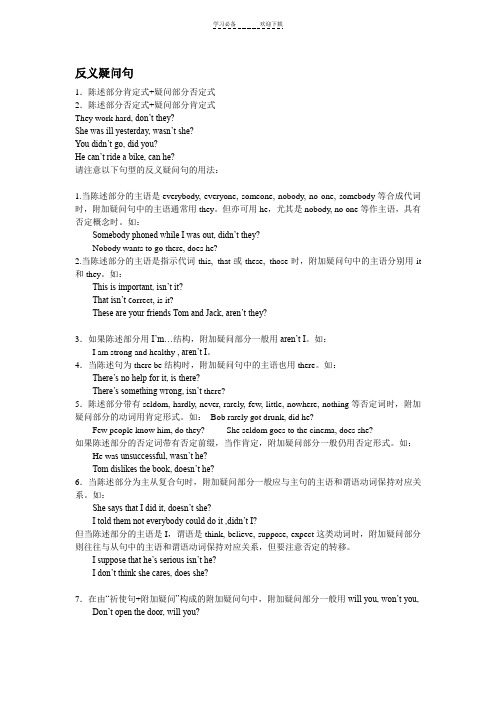
反义疑问句1.陈述部分肯定式+疑问部分否定式2.陈述部分否定式+疑问部分肯定式They work hard, don’t they?She was ill yesterday, wasn’t she?You didn’t go, did you?He can’t ride a bike, can he?请注意以下句型的反义疑问句的用法:1.当陈述部分的主语是everybody, everyone, someone, nobody, no one, somebody等合成代词时,附加疑问句中的主语通常用they。
但亦可用he,尤其是nobody, no one等作主语,具有否定概念时。
如:Somebody phoned while I was out, didn’t they?Nobody wants to go there, does he?2.当陈述部分的主语是指示代词this, that或these, those时,附加疑问句中的主语分别用it 和they。
如:This is important, isn’t it?That isn’t c orrect, is it?These are your friends Tom and Jack, aren’t they?3.如果陈述部分用I’m…结构,附加疑问部分一般用aren’t I。
如:I am strong and healthy , aren’t I。
4.当陈述句为there be结构时,附加疑问句中的主语也用there。
如:There’s no help for it, is there?There’s something wrong, isn’t there?5.陈述部分带有seldom, hardly, never, rarely, few, little, nowhere, nothing等否定词时,附加疑问部分的动词用肯定形式。
反义疑问句的讲解及练习(含答案)
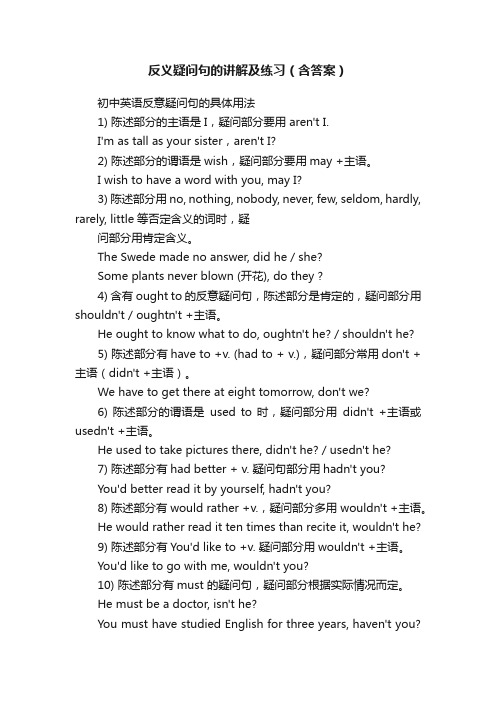
反义疑问句的讲解及练习(含答案)初中英语反意疑问句的具体用法1) 陈述部分的主语是I,疑问部分要用 aren't I.I'm as tall as your sister,aren't I?2) 陈述部分的谓语是wish,疑问部分要用may +主语。
I wish to have a word with you, may I?3) 陈述部分用 no, nothing, nobody, never, few, seldom, hardly, rarely, little等否定含义的词时,疑问部分用肯定含义。
The Swede made no answer, did he / she?Some plants never blown (开花), do they ?4) 含有ought to 的反意疑问句,陈述部分是肯定的,疑问部分用shouldn't / oughtn't +主语。
He ought to know what to do, oughtn't he? / shouldn't he?5) 陈述部分有have to +v. (had to + v.),疑问部分常用don't +主语(didn't +主语)。
We have to get there at eight tomorrow, don't we?6) 陈述部分的谓语是used to 时,疑问部分用didn't +主语或usedn't +主语。
He used to take pictures there, didn't he? / usedn't he?7) 陈述部分有had better + v. 疑问句部分用hadn't you?You'd better read it by yourself, hadn't you?8) 陈述部分有would rather +v.,疑问部分多用 wouldn't +主语。
反义疑问句讲解以及练习题

反义疑问句讲解:一:基本知识(1)什么是反义疑问句?举个例子。
(2)结构:“肯定陈述+否定疑问”或“否定陈述+肯定疑问”(前肯后否or前否后肯)(3)两部分时态、人称应一致(人称需要用主格)。
She was ill yesterday, wasn’t she? You didn’t go, did you?(4)简略问句如果是否定式,not应与be,do,will等系动词、助动词、情态动词缩写,不能出现not。
(5)简略问句的主语不用名词,应用人称代词,不能出现名词。
*练习:写出下列句子的反义疑问句:1.It looks like rain, ________________________?2.He doesn’t need to work so late,_____________________?3. She felt so bad yesterday ,______________________?4. Mr.Li will go to Paris,__________________________?二:知识升华(6) everything,anything,nothing,something时,附加疑问句中主语用it 不用they(7)this,that,或those,these时,附加疑问句中主语用it和they.(8)在there be句型中,附加疑问句中主语一般用be/情态动词/助动词+there(9)陈述句中含有not, no, hardly, neither, never, few, little, too…to等否定词或具有否定意义的词时,疑问部分常用肯定形式。
如:(10)如果主语是l’m,后反意部分用aren’t l(11)对反意疑问句的回答,是根据事实,而不是根据问题的提法。
He isn‘t a doctor, is he ? (他不是医生,是吗?)Yes,_____________________. He ___________(is/isn’t) a doctor.No, _________________________. He ______________(is/isn’t) a doctor.*练习:写出下列句子的反义疑问句:1. Nothing happened last night,__________________________?2. This is what I want ,____________________?3. Those are my pens, ____________________?4. There is something gone,__________________?5. There will be a meeting tomorrow,___________________?6. There seems to be some new books,___________________?7. Few people knew the news, _________________?8. Tom has never been to England,_________________________?9. l’ m late , _________________________?10.---Mary likes drawing, doesn’t she?---_____, she____________. She draws pictures every day!三、表示主语主观意愿的词含有think, believe, suppose, imagine, expect等动词后接宾语从句构成的主从复合句在构成反意疑问句时,视情况不同有两种不同的构成方式。
初二八下第9单元反义疑问句讲解与练习精编.docx

反义疑问句一、定义:反义疑问句是由陈述句和附在英后的附加疑问句组成。
(表示说话者对某事有一定看法,但又不完全确定,需要对方加以证实。
)翻译为“是吗”二、结构:陈述句+附加疑问句?It's hot today ,isn't it ?天气很热,不是吗?She speaks English very well, doesn't she?她英语讲得很好,不是吗?He can hardly stand, can he?他儿乎站不了,是吗?三、原则:1•前肯后否,前否后肯2.前名后代3.时态一致①They will go to town soon, won't they? ②He works very hard, doesn't he?四、做题方法(一)找动词(1)如果句中有助动词、情态动词、be动词,反意疑问句中也相应的用助动词、情态动词、be动词。
He is astudent, _____________ ? (2)如果句屮没有助动词、情态动词、be动词,只有实义动词时, 就要借助助动词。
She often get up at 6:30 every morning, ____________ ? (二)判断句子是肯定还是否定,“前肯后否,前否后肯”The students have planted many trees, __________ ?(三)反意疑问句的主语必须转换成人称代词主格。
The boy can't swim, ___________ ? 【练一练】一It's Father's Day, ___________ ? 一Yes. Let's buy a gift for Dad.A. isn't itB. doesn't itC. isn't heD. doesn't heYour school is very beautiful, ___________ ?A.isn't itB.is itC.is your school 一Jim had nothing for breakfast this morning, ________ ? —______ . He got up too late.A. had she; YesB. hadn't he; YesC. didhe; No【知识拓展】1、反意疑问句的回答:根据事实上的“是”或“否"回答,yes后面跟的一定是肯定句,no后面一定跟否定句。
反义疑问句讲解与练习
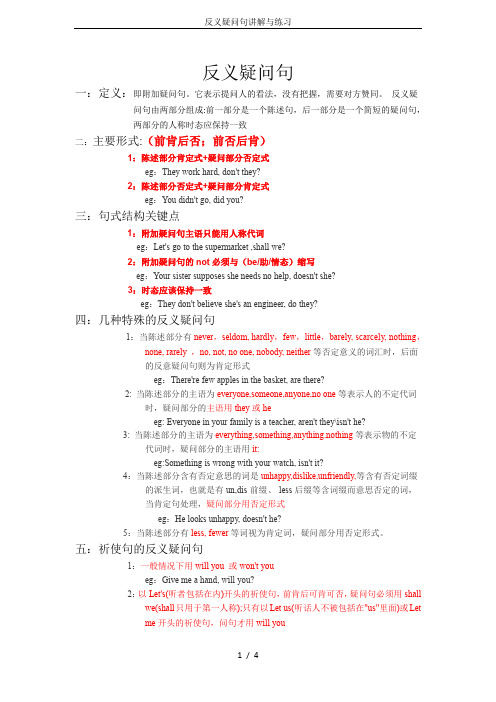
反义疑问句一:定义:即附加疑问句。
它表示提问人的看法,没有把握,需要对方赞同。
反义疑问句由两部分组成:前一部分是一个陈述句,后一部分是一个简短的疑问句,两部分的人称时态应保持一致二:主要形式:(前肯后否;前否后肯)1:陈述部分肯定式+疑问部分否定式eg:They work hard, don't they?2:陈述部分否定式+疑问部分肯定式eg:You didn't go, did you?三:句式结构关键点1:附加疑问句主语只能用人称代词eg:Let's go to the supermarket ,shall we?2:附加疑问句的not必须与(be/助/情态)缩写eg:Your sister supposes she needs no help, doesn't she?3:时态应该保持一致eg:They don't believe she's an engineer, do they?四:几种特殊的反义疑问句1:当陈述部分有never,seldom, hardly,few,little,barely, scarcely, nothing,none, rarely ,no, not, no one, nobody, neither等否定意义的词汇时,后面的反意疑问句则为肯定形式eg:There're few apples in the basket, are there?2:当陈述部分的主语为everyone,someone,anyone,no one等表示人的不定代词时,疑问部分的主语用they或heeg:Everyone in your family is a teacher, aren't they\isn't he?3:当陈述部分的主语为everything,something,anything.nothing等表示物的不定代词时,疑问部分的主语用it:eg:Something is wrong with your watch, isn't it?4:当陈述部分含有否定意思的词是unhappy,dislike,unfriendly,等含有否定词缀的派生词,也就是有un,dis-前缀、-less后缀等含词缀而意思否定的词,当肯定句处理,疑问部分用否定形式eg:He looks unhappy, doesn't he?5:当陈述部分有less, fewer等词视为肯定词,疑问部分用否定形式。
反义疑问句讲解_练习(常用)
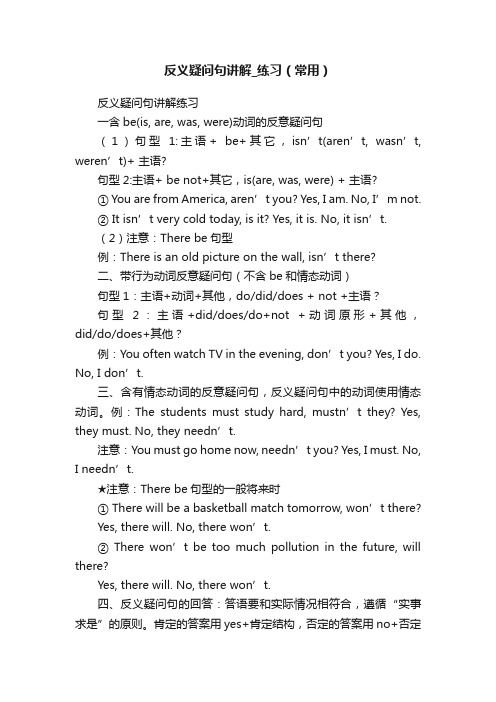
反义疑问句讲解_练习(常用)反义疑问句讲解练习一含be(is, are, was, were)动词的反意疑问句(1)句型1:主语+ be+其它,isn’t(aren’t, wasn’t, weren’t)+ 主语?句型2:主语+ be not+其它,is(are, was, were) + 主语?① You are from America, aren’t you? Yes, I am. No, I’m not.② It isn’t very cold today, is it? Yes, it is. No, it isn’t.(2)注意:There be句型例:There is an old picture on the wall, isn’t there?二、带行为动词反意疑问句(不含be和情态动词)句型1:主语+动词+其他,do/did/does + not +主语?句型2:主语+did/does/do+not +动词原形+其他,did/do/does+其他?例:You often watch TV in the evening, don’t you? Yes, I do. No, I don’t.三、含有情态动词的反意疑问句,反义疑问句中的动词使用情态动词。
例:The students must study hard, mustn’t they? Yes, they must. No, they needn’t.注意:You must go home now, needn’t you? Yes, I must. No, I needn’t.★注意:There be句型的一般将来时① There will be a basketball match tomorrow, won’t there?Yes, there will. No, there won’t.② There won’t be too much pollution in the future, will there?Yes, there will. No, there won’t.四、反义疑问句的回答:答语要和实际情况相符合,遵循“实事求是”的原则。
(完整)反义疑问句讲解和练习(答案)
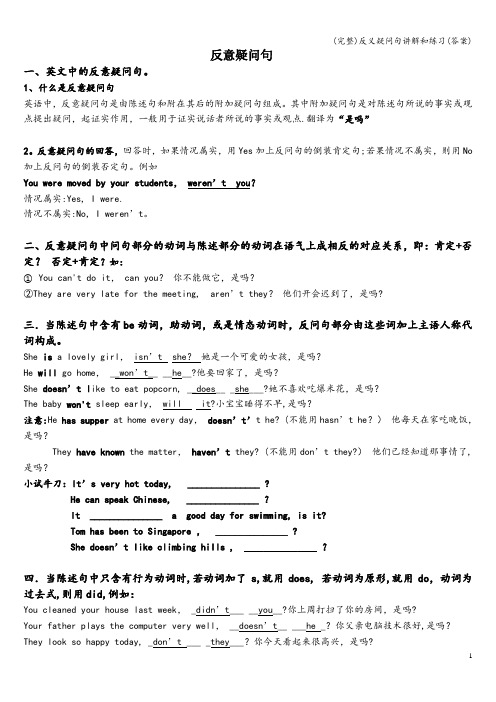
反意疑问句一、英文中的反意疑问句。
1、什么是反意疑问句英语中,反意疑问句是由陈述句和附在其后的附加疑问句组成。
其中附加疑问句是对陈述句所说的事实或观点提出疑问,起证实作用,一般用于证实说话者所说的事实或观点.翻译为“是吗”2。
反意疑问句的回答,回答时,如果情况属实,用Yes加上反问句的倒装肯定句;若果情况不属实,则用No 加上反问句的倒装否定句。
例如You were moved by your students,weren’t you?情况属实:Yes, I were.情况不属实:No, I weren’t。
二、反意疑问句中问句部分的动词与陈述部分的动词在语气上成相反的对应关系,即:肯定+否定?否定+肯定?如:①You can't do it, can you?你不能做它,是吗?②They are very late for the meeting, aren’t they?他们开会迟到了,是吗?三.当陈述句中含有be动词,助动词,或是情态动词时,反问句部分由这些词加上主语人称代词构成。
She is a lovely girl,isn’t she?她是一个可爱的女孩,是吗?He will go home, __won’t__ __he__?他要回家了,是吗?She doesn’t l ike to eat popcorn, __does__ _she___?她不喜欢吃爆米花,是吗?The baby won't sleep early, will it?小宝宝睡得不早,是吗?注意:He has supper at home every day,doesn’t’t he? (不能用hasn’t he?)他每天在家吃晚饭,是吗?They have known the matter,haven’t they? (不能用don’t they?)他们已经知道那事情了,是吗?小试牛刀:It’s very hot today, _______________ ?He can speak Chinese, _______________ ?It _______________ a good day for swimming, is it?Tom has been to Singapore , _______________ ?She do esn’t like climbing hills , _______________ ?四.当陈述句中只含有行为动词时,若动词加了s,就用does, 若动词为原形,就用do,动词为过去式,则用did,例如:You cleaned your house last week, _didn’t___ __you__?你上周打扫了你的房间,是吗?Your father plays the computer very well, __doesn’t__ ___he _?你父亲电脑技术很好,是吗?They look so happy today, _don’t ___ _they___?你今天看起来很高兴,是吗?小试牛刀: Meimei studies in a middle school, _______________ ?He loves cold weather , _______________ ?You finished the task yesterday, _______________ ?五.反意疑问句的陈述部分带有little, few, never, hardly, seldom,nobody, nothing,barely, scarcely等否定意义的词时,问句部分用肯定式.如:①She never tells a lie, does she?(不用doesn’t she?)她从不说谎,是吗?②He was seldom late, was he?(不用wasn’t he?) 他几乎不迟到,是吗?小试牛刀:Few students can answer the question, _______________ ?He can hardly finish his homework, _______________ ?六、反意疑问句的陈述部分为I am……时,问句部分习惯上用aren’t I?表示.如:I am a very honest man, aren’t I? 我是个很诚实的人,是吗?小试牛刀:I’m in Class 3,Grade 2, _______________ ?I’m ten years old, _______________ ?七.陈述部分的主语为不定代词something, anything, nothing, everything时,问句部分的主语用it。
- 1、下载文档前请自行甄别文档内容的完整性,平台不提供额外的编辑、内容补充、找答案等附加服务。
- 2、"仅部分预览"的文档,不可在线预览部分如存在完整性等问题,可反馈申请退款(可完整预览的文档不适用该条件!)。
- 3、如文档侵犯您的权益,请联系客服反馈,我们会尽快为您处理(人工客服工作时间:9:00-18:30)。
反意疑问句变反意疑问句遵循的基本原则:前肯后否,前否后肯例如:She is a beautiful girl, isn’t she ?She isn’t a beautiful girl, is she ?反意疑问句疑问部分动词的选择:主要看陈述句部分变一般疑问句或否定句用哪一个词,疑问部分的动词就用哪一个词。
例如:He is a clever boy, isn’t he ?He can speak English, can’t he ?She gets up at seven every morning, doesn’t she ? (陈述句部分变一般疑问句或否定句用助动词“does”,所以反问部分也用“does”。
)They have finished their homework, have n’t they ?反意疑问句疑问部分主语的选择:同陈述句部分的主语一致。
(注:当陈述句部分的主语是人名时,疑问部分的主语用它相应的人称代词“he”“she”“they”形式。
当陈述句部分的主语是其它名词时,疑问部分的主语用它相应的“it”“they”代词形式。
其它特殊情况在下面要讲到)使用反意疑问句要注意以下若干对应规则:1、反意疑问句的陈述部分带有no (no one/none/nothing/nobody), not, little, few, never, hardly, seldom等否定意义的词时,问句部分用肯定式。
如:①She never tells a lie, does she?(不用doesn't she?)②He was seldom late, was he?(不用wasn't he?)2、反意疑问句的陈述部分含有由un-, im-, in-, dis-, 等否定意义的前缀构成的词语时,陈述部分要视为肯定含义,问句部分用否定形式。
如:①Your father is unhappy, isn't he?(不能用is he?)②The man is dishonest, isn't he? (不能用is he?)③It is impossible to learn English without remembering more words, isn't it?(不能用is it ?)3、反意疑问句的陈述部分为I am……时,问句部分习惯上用aren't I?表示。
如:I am a very honest man, aren't I?4、复合句变反意疑问句分以下两种情况:当陈述部分为I(We) think(believe, suppose, consider) + that从句时,应根据从句来反问(即问句部分的动词及主语与that从句内的动词和主语保持一致)。
但是,用肯定还是用否定应根据主句来确定。
(仍遵循前肯后否,前否后肯的原则)如:①I think that he has done his best, hasn't he?②We think that English is very useful, isn't it? (不用don't we?)○3I don't think that you can do it, can you? (不用do I?)○4We don't believe that the news is true, is it? (不用do we?)除了以上情况外,其余的复合句变反意疑问句,都应根据主句来反问。
如:①They all think that English is very important, don't they? (不用isn't it?)②He didn't think that the news was true, did he? (不用wasn't/ was it?)○3They said that you had finished your work, didn't they? (不用hadn't you)○4Kate told you that she would go there, didn't she? (不用wouldn't she?)5、陈述部分的主语为不定代词something, anything, nothing, everything时,问句部分的主语用it。
如:①Something is wrong with the computer, isn't it?②Nothing has happened to them, has it?6、陈述部分的主语为不定代词somebody(someone), anybody(anyone), nobody(no one), everybody(everyone)时,问句部分的主语用he或they,这时问句动词的数应和he或they 一致。
如:hasn't he?Someone has taken the seat,haven’t they?7、祈使句的反意疑问句:不管是肯定的还是否定的祈使句,除“Let's……”用“shall we?”外,其余都可用“will you?”形式。
如:①Let me have a try, will you? ②Don’t sit down, will you? ③Let us stop to rest, will you?○4Let's go home together, shall we?8、陈述部分为There (Here) + be + 主语时,问句部分用动词+there(here)?形式。
如:①There are two cakes on the plate, aren't there?②Here is a story about Mark Twain, isn't here?9、陈述部分用had better +原形动词表示建议时,问句部分用hadn't +主语?形式。
①You'd better tell him about the matter, hadn't you?②We had better do it by ourselves, hadn't we?10、陈述部分的主语为动名词或不定式时,问句的主语用it代替。
如:①To do one good deed is easy for a person, isn't it?②Skating is your favorite sport, isn't it?11、前肯后否构成的祈使句的回答,yes译成“是”,no译成“不”。
前否后肯构成的祈使句的回答,yes译成“不”,no 译成“是”, 但yes后一定用肯定形式,no后一定用否定形式。
(注:回答时,最好根据句意,先答出“yes”、“no”后的部分,再确定用“yes”还是“no”。
)①He has supper at home every day, doesn't he? Yes, he does./ No, he doesn’t.他每天在家吃晚饭,不是吗?是的,他在家吃。
/ 不,他不在家吃。
②He doesn’t have supper at home every day, does he? Yes, he does./ No, he doesn’t.他每天不在家吃晚饭,是吗?不,他在家吃。
/ 是的,他不在家吃。
巩固练习:1. You don’t have to go school o n Sundays, _____________ you?A. haveB. doC. shouldD. would2. I don’t think he had his supper at the school, _____________?A. had heB. did heC. do ID. don’t you3. I don’t think he’d like to take such a difficult job, __________?A. had heB. would heC. do ID. don’t you4. I don’t think her passport’s gone, __________?A. is itB. has sheC. do ID. don’t you5. Do pay attention to my work and keep your eyes open all the time, ____________?A. will youB. don’t youC. shall weD. won’t we6. There’s little milk in the bottle, ___________?7. He’s waiting for the bus, __________?8. He’s waiting for a long time, _________?9. - He wasn’t ill, was he? --- __________, but he still went to school.A. Yes, he wasn’tB. No, he wasC. Yes, he wasD. No, he wasn’t10. ---He Lin hasn’t pass the test, _________? -- _________, because he studies hard.A. has He Lin; Yes, he hasB. has he; Yes he hasC. has He Lin; No, he hasn’tD. has he; No, he hasn’t11. Lucy can hardly speak French, ___________?12. Let’s have a rest, __________? Let us have a rest, _______? Don’t have a rest, ______?13. He’s fed the dog and the cat, _______?(09辽宁锦州市)A. doesn’t heB. isn’t heC. wasn’t heD. hasn’t he14. A lovely girl, ______?A. isn’t sheB. isn’t itC. is sheD. it15. —Are you going to the picnic with us tonight? –Yes.—You won’t be late, __?A. should youB. will youC. don’t youD. can you16. —The 11th National Games will be held in Shandong in October, 2009.—________ exciting news!A. HowB. WhatC. How anD. What an17. You'd rather watch TV this evening, ______?a. isn't itb. hadn't youc. wouldn't youd. won't you18. I suppose you're not going today, ______?a. are youb. do youc. don't youd. aren't you19. I wish to shake hands with you, ______?a. shallb. may Ic. do Id. will I20. Three hours ought to be enough time, ______?a. oughtn't three hoursb. didn't theyc. shouldn't itd. shouldn't three hours21. They have to study a lot, ______?a. don't theyb. haven't theyc. did theyd. hadn't they22. When the car crashed, your brother escaped being hurt, ______ ?a. didn't heb. did hec. did itd. didn't it23. I'm sure dirty, ______?a. am Ib. isn't Ic. aren't Id. am not I24. You seem to be dissatisfied with your present post. I don't think you judged your abilityobjectively when you applied for it, ______ you?a. dob. didc. don'td. didn't25. That's the sort of the book you want, ______?a. is it d. isn't that c. is that d. isn't it26. All these dictionaries are a great help to you, ______?a. are theyb. aren't theyc. are all these dictionariesd. aren't all these dictionaries27. The movie that we saw last week was quite interesting, ______?a. wasn't itb. was itc. didn't wed. weren't we28. Tom has been writing letters all afternoon, but he should have finished them by now, _____?a. hasn't heb. has hec. shouldn't hed. didn't you29. David told me that you would take a trip to America, ______?a. would youb. wouldn't youc. did youd. didn't you30. There appeared to be no better way, _______?a. was thereb. were therec. did thered. didn't there31. You had some trouble finding where I live, ______?a. didn't youb. hadn't youc. do Id. don't I32. He has his hair cut every month, ______?a. has heb. hasn't hec. does hed. doesn't he33. Your friend needs to come earlier, ______?a. does heb. doesn't hec. need hed. needn't he34. The little boy dare not go to church, ______?a. dare heb. daren't hec. does hed. doesn't he35. Susan would have worked abroad if she'd had the chance, ______?a. has sheb. hadn't shec. would shed. wouldn't she36. Everyone's having a good time, ______?a. is heb. isn't everyonec. does hed. aren't they37. Any one can join the club, ______?a. can any oneb. can't any onec. can't theyd. can they38. Tell me how to operate the electronic computer, ______?a. will youb. shan't youc. do youd. don't you39. Magaret scarcely comes to visit you on Christmas Day, ______?a. doesn't sheb. does shec. do youd. don't you40. Let's listen to the radio program that the teacher mentioned, ______?a. do web. don't wec. shall wed. shan't we41. You think you're funny, ______?a. didn't youb. are youc. don't youd. do you42. Janet used to take part in labor in that village, ______?a. used sheb. did shec. didn't shed. should she43. What beautiful weather, ______?a. is itb. isn't itc. won't itd. doesn't it44. He ought to go to Kwangchow by plane, ______?a. should heb. shouldn't hec. would hed. wouldn't he45. We never dared to ask him a question, ______?a. did web. didn't wec. dared wed. daren't we46. Nobody will believe how difficult his work has been ______?a. will heb. won't nobodyc. will theyd. won't they47. You must have made the mistake, ______?a. mustn't youb. haven't youc. didn't youd. hadn't you48. Learning how to repair computers takes a long time, ______?a. isn't itb. aren't theyc. doesn't itd. don't they49. Jack has coffee with breakfast, ______?a. hasn't Jackb. hasn't hec. doesn't Jackd. doesn't he50. They must have stayed at hotel last night, ______?a. mustn't theyb. haven't theyc. didn't theyd. hadn't they51. There isn't anything wrong with the radio, ______?a. is thereb. is itc. does itd. does there52. You must be hungry, ______?a. must youb. mustn't youc. are youd. aren't you53. Let's do the exercises by ourselves, ______?a. shall web. shan't wec. will youd. will we54. Her daughter had the carpets and curtains cleaned, ______?a. had sheb. hadn't shec. didn't shed. didn't her daughter55. The teacher had a talk with you, ______?a. has youb. hadn't shec. did shed. didn't she56. Something'll have to be done about the air pollution, ______?a. won't itb. will itc. has itd. does it。
